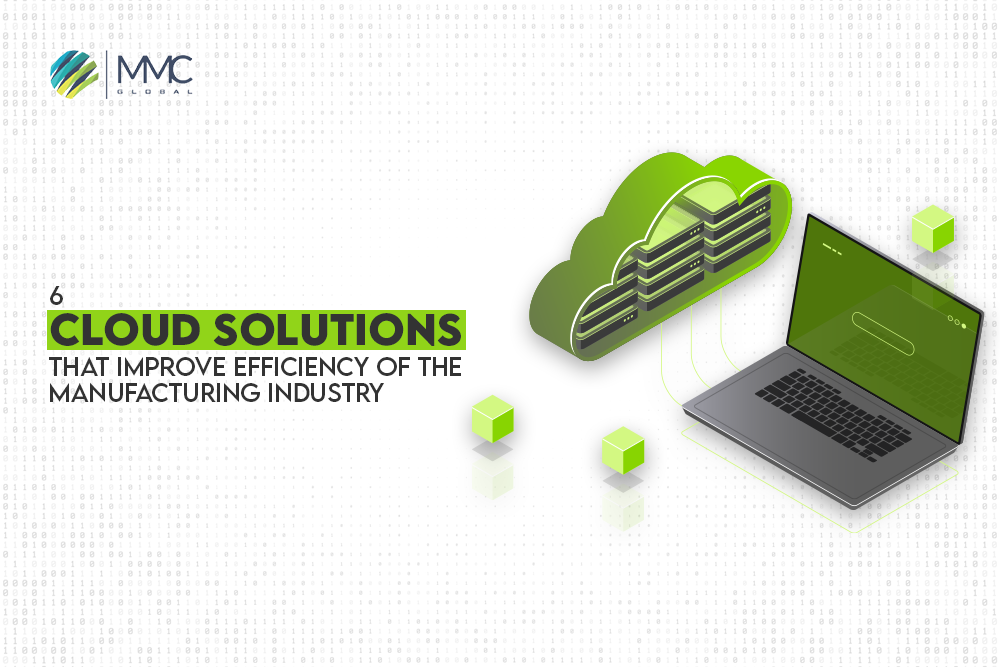6 Cloud Solutions That Improve Efficiency of The Manufacturing Industry


The manufacturing industry is outshining with the integration of cloud solutions that support bulk production with the utmost efficiency. With global advancements such as using AI for predictive maintenance, creating secure workflows, and implementing automation to avoid human error, cloud solutions empower overall business models to align with the company’s objectives.
In the manufacturing process, integrating digital solutions can improve the quality of the product, enhance employee efficiency, and cut costs and time. According to the industry’s needs, you can leverage the power of custom cloud solutions tailored to your specific manufacturing requirements to fulfill the operations.
At MMC Global, we provide a custom cloud application development company that easily integrates with the existing system. Our cloud application development services include cloud architecture, cloud apps, migration, deployment, and consulting. However, with extensive experience in building cloud solutions, we draft this article to uncover the potential of cloud solutions in the manufacturing industry.
A cloud solution is a remote server that delivers cloud services, including servers, storage, databases, networking, and software, over the Internet. Moreover, there are various cloud solutions for the manufacturing industry, including ERP, MES, PLM, SCM, QMS, and WMS.
Let’s discuss this in detail.
6 Cloud Solutions For The Manufacturing Industry
In this section, we will explore the potential of cloud computing to help the manufacturing industry stand out. By unifying all cloud solutions, we can build a centralized platform that connects all the primary functions of the manufacturing industry under one umbrella, paving the way for a future of unparalleled efficiency and innovation.
Enterprise Planning Resource (ERP)
ERP can be used by all sizes of manufacturing companies, from well-established enterprises to small-to-medium businesses. It is a multi-featured cloud-based software solution that integrates into significant business function processes. Furthermore, cloud ERP mainly contains multiple modules: finance, accounting, supply chain, HR, sales, marketing, and inventory management. These modules can independently work in respective departments but share a single database.
Benefits
- A single window to store data in a secure cloud environment.
- Remove redundancy, which eliminates unnecessary data occupancy.
- Real-time access to confidential and critical information.
- A collective approach to centralized primary manufacturing functions.
- Faster decision-making by analyzing in-depth analysis.
Manufacturing Execution Systems (MES)
MES cloud solution is a bridge between ERP cloud solutions and the manufacturing process to monitor and track manufacturing operations. The manufacturing execution system incorporates inventory tracking, documentation, raw materials, and intermediate/finished products.
Benefits
- Automate work orders, resource allocation, assigning tasks, and managing supplies.
- Track quality and suggest real-time improvements to ensure the quality of manufactured products.
- Monitor workforce productivity and stay in the loop with the workforce to align tasks.
- Promotes cost-effectiveness and keeps watch on time consumption.
Product Lifecycle Management (PLM)
The critical aspects of PLM are data and product manufacturing processes. Based on process manufacturing, a product life cycle should be established. The PLM Cloud solutions integrate with the product development process to improve product lifecycle management, including designing, developing, and selling.
- The PLM enhances team cohesiveness and collaboration to the next level.
- Easy to track timelines of projects that help deliver on-time final products.
- It positively impacts the cost of resources and ensures product scalability.
- Simplifies remote accessibility to track product lifecycle management.
Get more info: What Are The 7 Stages Of The New Product Development Cycle
Supply Chain Management (SCM)
It includes procurement, inventory management, demand forecasting, and logistic optimization. A cloud solution for supply chain management enhances the capabilities of accessing and controlling supplies effectively. Furthermore, a cloud SCM solution will help optimize resource allocation, cut costs, and simplify vendor management. The striking cloud storage handles a diverse range of data and centralizes the flow of information to maximize accessibility.
- Easy to integrate with other cloud solutions like inventory management, finance, etc.
- It simplifies placing orders, tracks raw materials, and monitors global distributions.
- Streamline association with distributors, suppliers, and other stakeholders for transparency.
- Help in making informed decisions by using predictive and analytics features.
Quality Management Systems (QMS)
Quality management systems are implemented to ensure the quality of manufactured products at every stage of manufacturing. During product manufacturing, flaws and discrepancies can occur in the product that can be questioned regarding the quality. By using QMS, businesses can improve the quality of products and distribute top-tier goods in the market.
- Fasten the process of accurate manufacturing and distribution.
- Enable delivering quality products that meet industry standards.
- It allows effective internal and external audits as well as monitoring of the manufacturing process.
- Instant control over wastage and time consumption is needed to avoid defect rates.
Warehouse Management Systems (WMS)
Warehouse management systems streamline warehouse operations, including supplies, inventories, and labor. They help management make informed decisions and speed up the supply chain and procurement process.
- Improve tracking over order management and allocation of resources.
- Streamline the manufacturing process by in-stocking raw materials.
- Integrating a systematic approach for enough product restocking.
- Track out-of-stock products and ensure overall packing, picking, and shipping efficiency.
Wrapping Up
Cloud solutions in the manufacturing industry are not just a trend but a game-changer. They promote efficiency, performance, and efficacy, ensuring company productivity. Moreover, implementing cloud solutions into the manufacturing workflow helps you manage administration, supply chain, warehouse, quality assurance, and more with safe and secure data repositories, giving you the confidence to embrace the future of manufacturing.
In fact, implement cloud solutions to unify your manufacturing workflows and centralized data to be accessible anywhere, anytime. Let’s connect with MMC Global, which has been working on building cloud solutions for decades. Our highly qualified team gathers the company’s requirements and suggests sustained yet futuristic solutions to grow your business.



